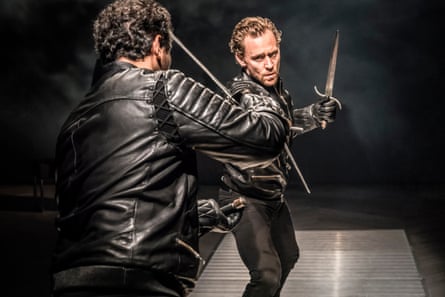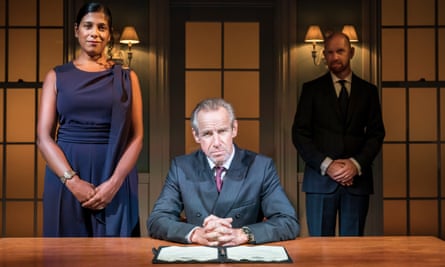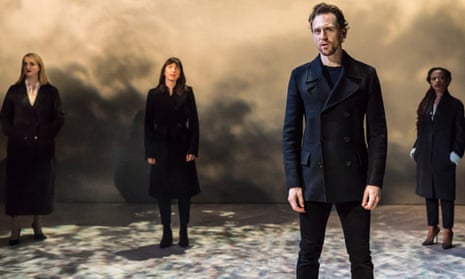Few shows are seemingly more exclusive than this. Tom Hiddleston plays the great Dane in a Kenneth Branagh production designed to raise funds for the Royal Academy of Dramatic Art.
Since it runs for three weeks in a 160-seat auditorium and all the seats were long since sold by public ballot, you might expect it to have an air of chi-chi privilege.
Yet the first performance had none of the air-kissing ballyhoo one associates with first nights. If anything, the occasion was remarkable for the traditionalism of Branagh’s production, the romanticism of Hiddleston’s Hamlet and the rapt concentration of the audience.
Hiddleston, as we know from past performances, is an accomplished Shakespearean actor. His Coriolanus was marked by a reckless impetuosity and his Cassio by a quiet grace. Both elements are present in this modern-dress Hamlet.

But, if I had to pick out Hiddleston’s key quality, it would be his ability to combine a sweet sadness with an incandescent fury. He suggests a fierce intellect gnawed by intense melancholy and yet subject to bouts of intemperate rage.
The grief is there from the start. The first thing we see in this production is Hiddleston’s Hamlet sitting at a piano and softly singing to himself “And will he not come again?”: the refrain that Ophelia later applies to her dead dad here becomes Hamlet’s lament for his own father.
Emotion is never far from the surface in this performance. When Polonius takes his leave of Hamlet and the prince says there’s nothing he’d more willingly part with “except my life”, Hiddleston’s sardonic jest turns into a well of unstoppable tears.

It is not, however, a sentimental performance. You notice the self-obsession in this Hamlet who constantly emphasises the first person singular.
There is also a genuine fury which he seems to have inherited from his father. Hiddleston bangs tables and pummels cushions in rage at his failure to achieve revenge.
And when he does finally think he has accomplished the task, by thrusting a dagger through a door that seems to conceal Claudius, Hiddleston leaps about on an ecstatic high only to learn he has murdered the wrong man. There is a genuine danger to this Hamlet as well as a delicacy of soul.
If I dub Branagh’s production “traditional”, it is because it ultimately gives us a vision of Hamlet as a man likely, had he been put on, “to have proved most royal”.
But the production, played by a cast of 10, has its quirky features. James Cotterill’s design, with its white sofas and tall windows, stresses the domestic rather than the political aspect of the play. Sean Foley plays Polonius less as a crafty statesman than as a conscious joker who hands out a packet of contraceptives to his departing son.
Hamlet’s stalwart friend also here becomes Horatia but, although the role is excellently played by Caroline Martin, I started to wonder if their spiritual closeness implied sexual intimacy.
Branagh, who has himself played Hamlet many times and also directed it for the movies, clearly understands the play inside out and gets a range of subtle performances.
One of the best comes from Nicholas Farrell, whose Claudius starts as a wholly plausible, persuasive head of state and then slowly reveals his moral turpitude: I loved the moment when he inquired, in astonishment, “From Hamlet?” as letters arrived from his supposedly murdered nephew.

Kathryn Wilder is a striking Ophelia forcing people at gunpoint into mourning her dead father. And Ansu Kabia plays a sonorous Ghost, a rhetorical Player King and a rapping gravedigger with equal aplomb.
In one way, it is sad that this production will be seen by so few people. But its purpose is to raise money in a good cause rather than to embellish reputations.
And, even if it rarely shocks one into new awareness, it has clarity, swiftness and, in the person of Hiddleston, a compelling Hamlet with a genuine nobility of soul.
- Hamlet is at the Jerwood Vanbrugh theatre, London, until 23 September. The ballot scheme for tickets has now closed. Michael Billington’s ticket was acquired through the ballot and paid for by the Guardian.

Comments (…)
Sign in or create your Guardian account to join the discussion